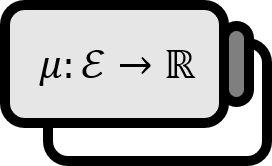Uniform Integrability
Definition
Let’s assume that a measure space $( X , \mathcal{E} , \mu)$ is given.
Given a set of Lebesgue integrable functions $\Phi \subset \mathcal{L}^{1}$, if for every $\varepsilon>0$, there exists $\delta > 0$ that satisfies $$ \mu (E) < \delta \implies \sup_{f \in \Phi} \int_{ E } \left| f \right| d \mu < \varepsilon $$ then $\Phi$ is said to be uniformly integrable.
Explanation
The concept of uniform integrability approaches the set concept as suggested by the term Uniformly, meaning that if it belongs to $\Phi$, there has to be a possibility for any function to make the norm $l_{1}$ value simultaneously smaller than $\varepsilon$, that is, to have a narrow $E$ or in other words, a small $\delta > \mu (E)$. Explaining it this way as a set might be mathematically rigorous but not intuitively easy to understand. As an example of a set of functions, think of the sequence $\left\{ f_{n} \right\}_{n=1}^{\infty}$, which can be explained more easily as follows: $$ \mu (E) < \delta \implies \sup_{n \in \mathbb{N}} \int_{ E } \left| f_{n} \right| d \mu < \varepsilon $$ However, the reason for hesitation in using this representation is because a sequence is after all a countable set. From the standpoint of real analysis, which must serve as the basis of various theories, there seems to be an uncomfortable restriction of possibilities.
On the other hand, a good example of uniform integrability is the uniformly integrable martingale in the theory of stochastic processes.
